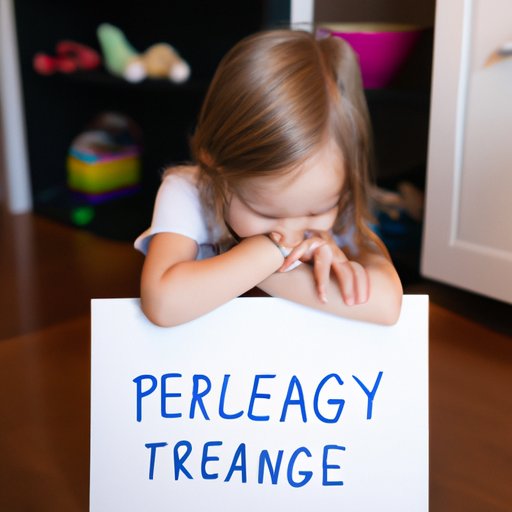
Introduction
Crying is a natural human response to various emotional triggers, including sadness, joy, and frustration. While the act of crying can offer great emotional relief, the aftermath can leave individuals feeling physically, emotionally, and mentally drained. This article explores why crying makes you tired and how to manage this phenomenon effectively.
Physiological Process of Crying and its Effects on the Body
Crying can be triggered by different emotional and physical stimuli, such as extreme emotions, physical pain, smoke, and even cutting onions! When we cry, tears produced by the lacrimal gland flow down our eye surface into the nose or throat, helping our body rid itself of potentially harmful substances. Emotional crying, triggered by intense emotions, also encourages blood flow redistribution and hormone release in the body.
This redistribution of blood and hormones increases our heart rate and breathing, leading to physical fatigue. Simultaneously, the chemical and electrochemical changes caused by crying can result in feelings of tiredness, reducing our cognitive function and leading to physical exhaustion. Therefore, crying does not only affect our mental health but also our physical wellbeing.
Emotional and Mental Drain Caused by Crying
Crying is an outlet for intense emotions such as disappointment, sadness, and frustration, which can take a toll on our emotional and mental health. Shedding tears helps us to release bottled-up emotions and process difficult experiences. However, the process of releasing emotions can be exhausting, leading to physical discomfort and fatigue.
When we cry, our brain releases hormones such as oxytocin, which can affect our mood and mental state. These hormones and other chemicals might influence our judgment or trigger emotional instability, making us prone to feeling tired and overwhelmed. Therefore, it’s essential to take care of our emotional and mental health after crying by practicing self-care and seeking therapy.
The Impact of Crying on Sleep Patterns
Crying can cause significant disruptions in our sleep pattern, leading to sleep deprivation and subsequent tiredness. When we cry, the hormonal changes that occur can make it difficult for us to fall asleep or experience full REM sleep, leading to insomnia.
Sleep deprivation can also lead to cognitive impairment, reduced immune function, and overall health deterioration. Therefore, implementing strategies to improve our sleep quality after crying is crucial to our well-being. We can practice relaxation techniques such as meditation, avoiding caffeine, and avoiding using digital devices before sleep.
The Types of Tears Produced and How They Affect Fatigue
Our body produces three types of tears – emotional, reflex, and irritant tears – each with different compositions and effects on our physical and emotional health. Emotional tears contain high levels of stress hormones, which can make us feel more exhausted than reflex and irritant tears.
Reflex tears are produced as a response to a physical stimulus, such as dust or onion vapors, and are useful in flushing out foreign bodies. Irritant tears, on the other hand, are a reaction to irritants and can aid in lubricating the eye surface.
Knowing the type of tears we produce can help us manage our fatigue levels accordingly. People experiencing emotional crying can benefit from proper sleep and relaxation, while those experiencing irritant or reflex tears can reduce fatigue by resting their eyes or using artificial eye drops to hydrate and soothe their eyes.
Factors That Influence Feeling Tired After Crying
Several factors can influence an individual’s degree of physical and emotional tiredness after crying. These factors include age, gender, emotional temperament, and the individual’s general wellbeing. Older people tend to feel more fatigued after crying than younger people due to age-related changes in hormones.
Women are more likely than men to cry and feel more emotional exhaustion than men, mainly due to hormonal changes. Those struggling with depression, anxiety, or other mental health disorders might also experience extended periods of fatigue after crying.
However, we can overcome these factors by practicing self-care, focusing on personal growth, and prioritizing our well-being. This way, we can manage our emotions more effectively, reducing the severity of tiredness after crying.
Psychological Benefits of Crying and How They Offset Tiredness
Crying can have tremendous psychological benefits, including stress relief, improved mood, and emotional stability. While crying can make us feel exhausted, these benefits can offset feelings of tiredness. Shedding tears can help with processing negative emotions, promoting mental healing, and improving overall well-being.
However, it’s essential to note that crying alone might not suffice in improving emotional and mental well-being. One can seek counseling, therapy, or other forms of professional support to help process emotions more effectively.

Practical Tips for Managing Tiredness After Crying
Managing feelings of fatigue and emotional exhaustion after crying is vital to our overall well-being. The following are practical tips for managing tiredness:
– Practice good sleep hygiene, including adequate sleep schedules and relaxing sleep-inducing habits.
– Incorporate light to moderate exercise into your daily routine.
– Practice relaxation techniques, including meditation, yoga, and deep breathing techniques.
– Connect with friends and family, seeking support and building a supportive network.
– Engage in activities you enjoy, such as reading a book, listening to music, or taking a walk in nature.
Conclusion
Crying is a natural human response to emotional and physical stimuli, and while it has its benefits, it can lead to physical and emotional exhaustion. Knowing how to manage your tiredness after crying involves tailoring your strategies to your emotional and physical well-being.
Sleep hygiene, relaxation techniques, engaging in activities you enjoy, and socializing with friends and family are some practical ways to manage the physical and emotional fatigue associated with crying. In the end, seeking professional help is critical in addressing emotional and mental distress, guarding against further emotional fatigue and exhaustion.




